Introducing Foreign Models for Development
Japanese Experience and Cooperation in the Age of New Technology
Contributor(s)
Ohno, Izumi (editor)
Jin, Kimiaki (editor)
Amatsu, Kuniaki (editor)
Mori, Junichi (editor)
Language
EnglishAbstract
This open access book studies how foreign models of economic development can be effectively learned by and applied to today’s latecomer countries. Policy capacity and societal learning are increasingly stressed as pre-conditions for successful catch-up. However, how such learning should be initiated by individual societies with different features needs to be explained. The book answers this pragmatic question from the perspective of Japan’s past experience and its extensive development cooperation in Asia, Africa, and Latin America. Since the late nineteenth century, Japan has developed a unique philosophy and method for adopting advanced technologies and systems from the West; the same philosophy and method govern its current cooperation with the developing world. The key concepts are local learning and translative adaptation. Local learning says that development requires the learner to adopt a proactive mindset and the goal of graduating from receiving aid. Meanwhile, translative adaptation requires foreign models be modified to fit local realities given the different structures of the home and foreign society. The development process must be wholly owned by the domestic society in rejection of copy-and-paste acceptance. These ideas not only informed Japan but are key to successful development for all. The book also asks how this learning method should—or should not—be revised in the age of SDGs and digitalization. Following the overview section that lays out the general principles, the book offers many real cases from Japan and other countries. The concrete actions outlined in these cases, with close attention to individual growth “ingredients” as opposed to general theories, are crucial to successful policy making. The book contains materials that are highly useful for national leaders and practitioners within developing countries as well as students of development studies.


 Download
Download Web Shop
Web Shop